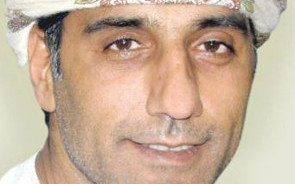On 23 October 2017, Omani authorities released the Deputy Editor of the recently closed Azamn newspaper, Yousef Al-Haj, from prison after he spent over a year behind bars due to comments made in Azamn. As reported by the Gulf Center for Human Rights (GCHR), al-Haj was originally arrested in August 2016, along with two colleagues, for his work with the independent news organization. On the same day that al-Haj was arrested, the Omani Ministry of Information called for the permanent closure of Azamn, signalling the government’s continued suppression of the domestic press.
According to Human Rights Watch, this is not the first time al-Haj has been targeted for his work with Azamn. Al-Haj was previously convicted of “‘defaming’ and ‘insulting the dignity’ of the justice minister and his deputy,” in an article he published on 14 May 2011. He was then sentenced to five months in prison, and Azamn was to be shut down for a month.
Al-Haj is not the only member of Azamn’s staff to face prison time for his work. The editor-in-chief of Azamn, Ibrahim al-Maamari, was arrested on 28 July 2016, Zaher al-Abri, another editor, was arrested on 3 August 2016, and al-Haj was arrested on 9 August 2016. Al-Haj and al-Maamari were officially charged in September 2016 with “disturbing public order,” “misusing the internet,” “publishing details of a civil case,” and “undermining the prestige of the state.” Al-Abri was separately charged with using “an information network [the internet] for the dissemination of material that might be prejudicial to public order.” Al-Haj and al-Maamari were sentenced to three years in prison and a fine of 3,000 Omani Rials (US$7,800), and al-Abri was sentenced to one year in prison with a fine of 1,000 Omani Rials ($2,600). The three appealed the charges, and on 26 December 2016, al-Abri was acquitted. Al-Haj and al-Maamari, however, were sentenced to one year and six months in prison respectively.
Azamn was established in 2007, and ran independently until August 2016. The article that led to the government’s closure of the newspaper was published on 26 July 2016 and was entitled “Supreme bodies tie the hands of justice.” In the article, the newspaper addressed the interference of corrupt senior officials in judicial decisions. Indeed, the trial that decided the shuttering of the newspaper has itself been called into question. Isaac al-Bousaidi, the President of the Omani Supreme Court, the body overseeing the trial, was reportedly called out in the article for corruption, possibly tarnishing the results of the trial. After the ruling, the Public Prosecution challenged the Supreme Court’s ruling in the Court of Appeals before the Supreme Court issued a final ruling on 5 October 2017 calling for the permanent closure of the newspaper.
Azamn’s forced shutdown is part of the reason for Oman’s poor ratings in both Reporters Sans Frontieres’ annual World Press Freedom Index and Freedom House’s annual report. In 2017, Oman ranked 126 out of the 180 countries analyzed placing it close to the bottom of the six GCC states in terms of press freedom, ranked only above Saudi Arabia at 164 and Bahrain at 163. Similarly, in Freedom House’s 2017 Press Freedom report, countries were ranked with a score between 0 and 100, 0 being the most free and 100 being not at all free. While Norway scored an 8 and America a 23, Oman scored 70. The report takes into account each country’s legal, political, and economic environment, and Oman’s low score is largely due to its legal environment. In particular, the authorities’ arrests of independent journalists and dissolution of newspapers, such as Azamn, Al-Balad, and online magazine Al-Mowaten, which have negatively impacted its ratings across the board.
Mowaten, meaning citizen, was an independent online magazine that worked to “monitor the events of the community and takes care of citizens’ issues in Oman and the Arabian Gulf.” Though it was blocked throughout Oman on World Press Freedom Day – 14 January 2016 – it continues to be published remotely from the United Kingdom. Al-Balad, which was created in 2012, also decided to cease all production in 2016 due to sustained harassment from authorities, specifically the Internal Security Service (ISS). As an arm of the government, the ISS suppresses fundamental freedoms like the right to free and peaceful expression by “threatening, imprisoning and torturing independent journalists and Internet activists who are trying peacefully to express their views on social media to defend people’s rights and confront corruption.”
Despite the Omani government’s release of Yousef al-Haj, it continues to suppress, target, and prosecute press freedoms and journalists for publishing works critical of the government. Oman must take steps to halt the suppression of fundamental freedoms. It can do this by dropping the case of the Azamn newspaper and vacating all of the charges. Fundamentally, however, Oman must guarantee that journalists and independent media are able to function freely, and that freedom of expression in Oman is respected according to international standards, including Article 19 of the Universal Declaration of Human Rights.
Sophie Marianos is an Advocacy Intern at ADHRB





